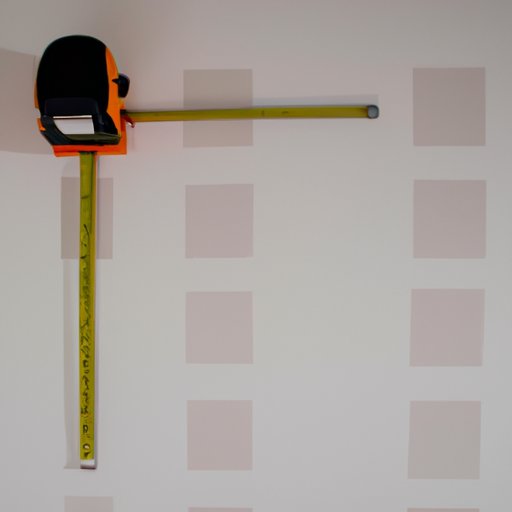
Introduction
Measuring the square footage of a wall is a common problem that many people encounter, especially when it comes to painting or tiling. While it can seem daunting at first, accurately calculating square footage is actually quite simple. This article provides a step-by-step guide on how to measure the square feet of a wall, along with common mistakes to avoid and useful tips for ensuring accurate measurements.
Step-by-Step Guide
Accurate measurements are crucial when calculating square footage. To begin, gather the tools you’ll need: a measuring tape, a pencil, and a calculator. Start by measuring the height of the wall, from floor to ceiling. Record this measurement in feet and inches, and write it down. Then, measure the width of the wall at the widest point. Write this measurement down as well.

Next, multiply the height and width measurements together to get the square footage. For example, if the wall is 10 feet high and 12 feet wide, the total square footage is 120 square feet. It’s important to measure to the nearest inch to ensure the most accurate results.
Common Mistakes to Avoid
One common mistake people make when measuring a wall is not accounting for openings, such as windows or doors. To avoid this mistake, measure the height and width of the wall as if there were no openings, and then subtract the square footage of any openings from the total square footage of the wall. Another common mistake is measuring the wall incorrectly. Always double-check your measurements to ensure accuracy.
Tools You’ll Need
When measuring and calculating square footage, you’ll need a few essential tools. A measuring tape is needed to measure both the height and width of the wall, while a pencil is necessary to record these measurements. A calculator is also required to perform the multiplication required to find the square footage. Additionally, a level is useful for ensuring accurate measurements.
Applications
Measuring square footage is important for various applications, including painting, tiling, and wallpapering. To calculate the square footage for painting, measure all surfaces that will be painted, including the ceiling. For tiling, measure the surface area that will be tiled, again accounting for any openings. By measuring square footage accurately, you can ensure you have the right amount of materials needed for your project.
Frequently Asked Questions
Q: Can I measure the square footage of a wall using a laser measure?
A: Yes, a laser measure can be used to accurately measure the height, width, and length of a wall.
Q: Do I need to measure to the nearest inch?
A: Yes, measuring to the nearest inch ensures the most accurate results.
Q: How do I measure around odd-shaped features, like a fireplace?
A: Break the wall down into smaller sections and measure each section individually.
Conclusion
Measuring the square footage of a wall may seem daunting at first, but by using the correct tools and following the steps outlined in this article, it is a relatively simple process. Remember to double-check your measurements and account for any openings or odd-shaped features to ensure accuracy. By doing so, you’ll be able to estimate the correct amount of materials needed for your project. If you have any further questions or concerns about measuring square footage, don’t hesitate to contact us for assistance.






